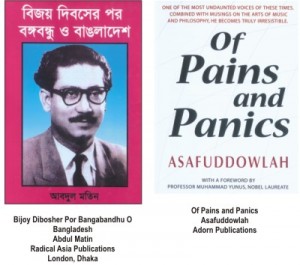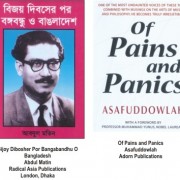Founding father under siege . . .
 Abdul Matin’s persistence in keeping the historical record straight for Bangladesh is admirable. More to the point, it has been a necessary truth in the collective life of the Bengalis. You could suggest that if Matin were not around to keep us focused on the politics of Bangladesh as it was forged and pressed forward in the 1960s and the 1970s, there would be a huge need to go looking for someone of his kind. Obviously, Matin has done his job well. His preoccupation with Bangabandhu Sheikh Mujibur Rahman remains, a particular reason being his understanding that the founding father of Bangladesh has, directly as also indirectly, been under unremitting siege since his assassination in August 1975. To be sure, over the years, Bangabandhu’s legacy has regained some of its earlier lustre, thanks principally to the particularly strong niche his daughter Sheikh Hasina occupies in national politics and thanks also to the concerted struggle his party, the Awami League, has waged over more than three decades to restore his reputation as the man behind the creation of Bangladesh.
Abdul Matin’s persistence in keeping the historical record straight for Bangladesh is admirable. More to the point, it has been a necessary truth in the collective life of the Bengalis. You could suggest that if Matin were not around to keep us focused on the politics of Bangladesh as it was forged and pressed forward in the 1960s and the 1970s, there would be a huge need to go looking for someone of his kind. Obviously, Matin has done his job well. His preoccupation with Bangabandhu Sheikh Mujibur Rahman remains, a particular reason being his understanding that the founding father of Bangladesh has, directly as also indirectly, been under unremitting siege since his assassination in August 1975. To be sure, over the years, Bangabandhu’s legacy has regained some of its earlier lustre, thanks principally to the particularly strong niche his daughter Sheikh Hasina occupies in national politics and thanks also to the concerted struggle his party, the Awami League, has waged over more than three decades to restore his reputation as the man behind the creation of Bangladesh.
The work under review is fundamentally an addition to the position Matin has adopted, through his earlier books, on Sheikh Mujibur Rahman. He believes, and quite rightly too, that the slings and arrows which have been hurled at Bangabandhu are of a nature that ought not to be taken seriously and yet cannot quite be ignored because of the fair degree of consistency with which his detractors have been trying to run him down posthumously. Many have been the instances when Mujib was castigated for the way he administered the country between 1972 and 1975. It is such criticism which Matin counters in this work. And in doing so, he makes sure that his arguments are backed by necessary documentary references. An instance of it relates to the declaration of independence on 26 March 1971 moments into the genocide launched by the Pakistan army in Dhaka. Matin quotes from United States government documents to underscore the point that Bangabandhu made the call for freedom soon after the army fanned out to different locations in the city.
Obviously, a good deal of what the writer presents here is by now the historical truth. The difference between Matin and the others who remain aware of national history as it developed after March 1971 is that the former bases his statements on well-founded recorded material. He never misses giving readers the footnotes that scholarly work demands, something that a large number of Bengali chroniclers of national history have generally failed to do. It is against such a background that the reader is given to understand the circumstances behind Mujib’s release by the government of Zulfikar Ali Bhutto in early 1972 and his subsequent flight to freedom. Matin admires the sagacity in the Bengali leader, a sign of which comes through in the withdrawal of Indian troops from Bangladesh in March 1972. Without saying as much, the writer conveys the impression that the withdrawal could not easily have come to pass had Mujib not been around. In bare terms, the physical presence of Bangabandhu on the Bangladesh scene was to prove pivotal in a good number of ways. The upshot of it all is that Matin appears to be convinced that the troubles Bangabandhu’s government faced in those formative years of Bangladesh’s history were in more ways than one the result of the conspiratorial politics his government could not quite put its finger on. To a very large extent, he is right. But then comes the matter of the rift between Bangabandhu and Tajuddin Ahmed. It is here that Matin appears to be sailing against the wind when he asserts that in quite a number of ways the man who led the wartime Mujibnagar government as prime minister dealt some bad body blows to Mujib even as he served as finance minister in Bangabandhu’s government. Contrary to popular belief that Tajuddin Ahmed found himself increasingly sidelined in Bangabandhu’s government, largely because of his enemies getting better access to the prime minister, Matin is excoriating about what he considers to be the finance minister’s perfidy in finding fault with the way Bangabandhu ran the administration. Matin’s considered opinion is that Bangabandhu’s Second Revolution was essentially what the Father of the Nation said it was: that the Bangladesh Krishak Sramik Awami League (Baksal) was a platform that brought together the nation’s political parties together in the larger national interest. Tajuddin had a different perspective on the development, of course.
There are some bare truths Matin reveals here. The story of how Serajur Rahman, he of the BBC’s Bengali Service, was thwarted in his attempts to come by a job in Bangabandhu’s government is what the writer relates, no holds barred, in the work.
Read the book. It adds to your understanding of the forces which shaped politics in Bangladesh in the early 1970s.
. . . Symmetry of the grand and the banal
ASAFUDDOWLAH’S has been a vibrant presence on the Bengali social and bureaucratic scene. His is and has always been an articulate voice. As a civil servant, he was known for his sense of independence, to a point where many thought twice about coming across him. Rare was the individual who wished to fall foul of him, for Asafuddowlah did not mince words when it came to offering an opinion on men and matters. It was always strength of character that defined the man. And it is something that continues to underpin his perspectives on things around him. On television chat shows, he offers his own clear assessments of political conditions, some of which may not go down well with his detractors. They may, indeed do, find him abrasive at times.
The point here is that Asafuddowlah remains indifferent to all such expressions of sentiment about him. His outspokenness is all. And with that comes the other side of his personality, that which keeps him riveted to the world of music. Even as he has pursued a career in the civil service, first in Pakistan and then in Bangladesh, he has made sure that songs have remained close to him, or he to them. He has composed music, he has lent his voice to songs and he has discoursed on them. His rendering of ghazals has been remarkable. Anyone who has heard him sing the old Jagmohan number, ik baar muskura do, will know of the artistry he is capable of calling forth. In his wider social ambience, Asafuddowlah is the quintessential conversationalist, with an interplay of serious thought and humour that make him stand out as the star in the crowd.
And this is the background against which Of Pains and Panics must be read. Asafuddowlah falls into the mould of those who came of age in an era of enlightenment and then went on to reshape the era according to their specifications. Like many of his social club, he has believed in approaching life from an intellectual point of view. Just how much of suavity he has brought into his observations of life comes through in this eminently readable compendium of his thoughts on an array of subjects not many would care to spend time on these days. There are clear divisions of the essays into wide-ranging swathes of territory. Begin with music. There is a sense of certainty, for obvious reasons, with which he approaches the many strands of the subject. He takes the BBC to task, for all the right reasons, over its selection of historically notable Bangla songs. It is pretension he slices through here. And then he moves on to pay obeisance to the artistes who have with regularity enhanced the quality of Bengali music. Protima Banerjee is one he reveres. Another is the all-encompassing Kamal Dasgupta. The music director, he informs us, remained self-effacing right till the end. And as the end approached, as he was being wheeled into hospital, the officer on duty had an asinine question: was Dasgupta a class one officer? Ah, artistes lose out, often if not always, to the bureaucracy!
Some of the most touching of articles in this collection connect Asafuddowlah to those he was once close to, until death intervened to take them away. He writes with deep affection on his mother and then reflects on his father. Perhaps a coruscating part of the tribute to Khan Bahadur Moulvi Mohammad Ismail is the praise he showers on his niece Komli (‘…his youngest daughter’s youngest daughter, Komli, who he used to adoringly call ‘Chand di’, nursed him in his fading days with a kind of special devotion I have never witnessed in my life’). It is a vast world of thoughts Asafuddowlah covers in the work. His views on America are a sharp response to Washington’s actual behaviour on the global scene. In Bangladesh, he wonders aloud at the swift decline in the quality of politics, almost to a point where the powerful begin to think of themselves as little gods. There is a symmetry he establishes between the grand and the banal. How else would you observe his tribute to Ustad Salamat Ali Khan and then his consternation at the presence of so many ministers in the government of as small a country as Bangladesh?
Asafuddowlah is combustive by nature. That is his assessment of himself. Just how combustive — and combative — he can be is an exercise you might as well opt for through reading these pieces. He is not being didactic; he carefully avoids scaling the Olympian heights that lesser men always strive for. He gives you the workings of his mind as they happen to be — blunt, irreverent but playing with ideas all the same.
Two reviews from Syed Badrul Ahsan / Syed Badrul Ahsan is Editor, Current Affairs, The Daily Star.







